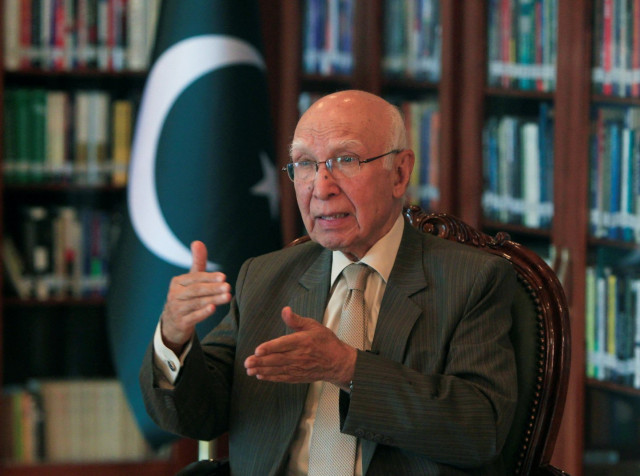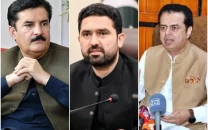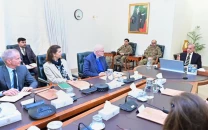Pakistan will remain neutral in Saudi-Qatar row: Aziz
Prime minister’s adviser says govt does not want to interfere in other countries’ matters

Prime Minister’s Adviser on Foreign Affairs Sartaj Aziz. PHOTO: Reuters
“Pakistan does not want to interfere in other countries’ matters and will stick to its non-partisan policy on the Middle East issue,” Prime Minister’s Adviser on Foreign Affairs Sartaj Aziz told the Senate Standing Committee on Foreign Affairs.
Saudi Arabia, Egypt, Bahrain, Yemen, Libya and the United Arab Emirates announced on June 5 they were severing diplomatic ties with Qatar after accusing it of supporting terrorism.
During the briefing, PPP Senator Kareem Khawaja expressed his reservations over Pakistan’s role in the Saudi Arabia-led Islamic Military Alliance against Terrorism (IMAT). He urged the government to recall former army chief General (retd) Raheel Sharif, who has been cleared to lead the 41-nation coalition.
Responding to the concerns, Aziz said the government could not recall the former army chief from Saudi Arabia since he joined the alliance in his personal capacity.
In a statement issued later, the Foreign Office spokesperson said the premier’s adviser told the panel that Gen (retd) Raheel had been issued a no-objection certificate (NOC) to head the alliance in accordance with the rules. He pointed out that Aziz had been misquoted by a section of the media.
Saudi king appoints son as crown prince in major reshuffle
The statement added that the policy regarding Pakistan’s participation in different activities of the alliance will be decided by the government in consultation with parliament after the coalition’s terms of reference (ToRs) have been finalised.
Pakistan in principle agreed to be part of the military alliance, but it has clarified that the scope of its participation has not yet been decided.
Officials familiar with the development said the ToRs of the alliance have yet to be finalised. They said Pakistan’s participation would remain confined to efforts seeking eradication of terrorism.
The alliance was first announced by Saudi Arabia in December 2015. However, countries such as Iran, Syria and Iraq were not invited to join the grouping – something which raised fears that the Saudi initiative may be aimed at certain countries.
Those fears were further strengthened when Saudi leadership openly targeted Iran in the recently held Arab-US summit in Riyadh. Since then Pakistan has been treading a careful path and has been in contact with Iran through back channels to allay its concerns.
Aziz told the Senate committee that Pakistani troops present in Saudi Arabia would not take part in any activity aimed at other Muslim countries. He insisted that the military alliance was meant to fight terror threat.
Saudi military alliance: Pakistan seeks to find a middle ground
The adviser also made it clear that the government would formulate its policy in keeping with the parliamentary resolution adopted on the Yemen conflict in April 2015. He said the resolution called upon the government to maintain neutrality while emphatically opposing sending troops to Yemen.
Committee chairperson Nazir Sadiq remarked that the government was trying to maintain balance as Prime Minister Nawaz Sharif had not only met Saudi King Salman bin Abdulaziz but was also in touch with Qatar as part of efforts to end the stalemate in the Gulf.



















COMMENTS
Comments are moderated and generally will be posted if they are on-topic and not abusive.
For more information, please see our Comments FAQ